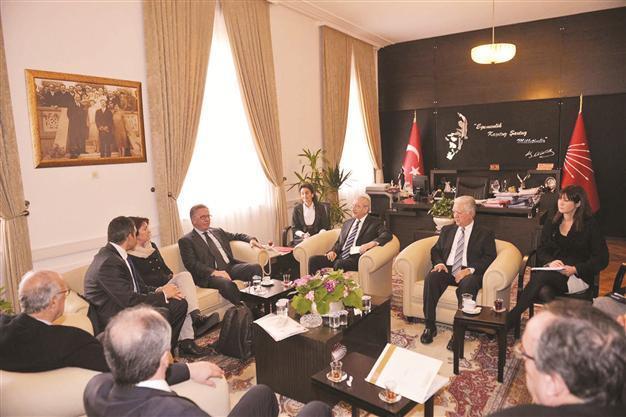Charter panel rejects Venice Commission ‘guardianship’
ANKARA - Hürriyet Daily News

A group from the Council of Europe’s Venice Commission has made a visit to the main opposition Republican People’s Party (CHP) in Ankara last week. AA photo
Parliament’s Constitution Reconciliation Commission has rejected an offer by the Council of Europe’s Venice Commission to aid in the ongoing process on the grounds that such assistance would lead to the European body’s “guardianship” over the commission.The proposal by the Venice Commission was conveyed to the members of the commission by Parliamentary Speaker Cemil Çiçek on Feb. 19, but it was met with resistance from the ruling Justice and Development Party (AKP), the Nationalist Movement Party (MHP) and the Peace and Democracy Party (BDP). Only the main opposition Republican People’s Party (CHP) looked favorably on the proposal.
During the meeting, the AKP’s Mehmet Ali Şahin and Ahmet İyimaya said the commission’s experience so far was sufficient to draft a commission on its own.
Members of the commission from both the MHP and BDP supported the AKP deputies’ stance, while CHP’s Atilla Kart stated that “consultations could be held.”
“Three parties objected to the Venice Commission’s proposal,” Şahin said. “The idea which prevailed at the commission was that the proposal was not necessary and that it could lead to an impression of guardianship by the Venice Commission, thus possibly casting a shadow over the ongoing work.”
The president of the Venice Commission, Gianni Buquicchio, was in Ankara last week in order to address a meeting of the Turkey-EU Joint Parliamentary Committee on the topic of the “New Constitution in the Framework of Fundamental Rights and Freedom.” While there, Buquicchio did not hide his unease over certain flaws concerning the ongoing charting-drafting process, including his concerns over the AKP’s proposal for a presidential system.
Opinions sought
Only a few years ago, the Venice Commission was requested to prepare opinions on draft laws within the context of Turkish constitutional reforms that were approved in a referendum in September 2010.
Priority was given to the reform of judicial structures, with laws on the Supreme Board of Judges and Prosecutors (HSYK) and the Constitutional Court adopted in December 2010 and March 2011, respectively; in both cases, the Venice Commission was consulted during the process.
Ironically, at the time, it was both the CHP and the MHP which had campaigned against the constitutional reform, while the BDP boycotted the vote.
During the meeting on Feb. 19, the commission also debated the article covering the Religious Affairs Directorate (Diyanet). While the CHP and the MHP argued that the expression of “secularism” within the article should be kept, the AKP suggested omitting the expression and using instead the expression of “political impartiality.”
Because there was ultimately no consensus on the matter, the article was written with reservations from each party.
















